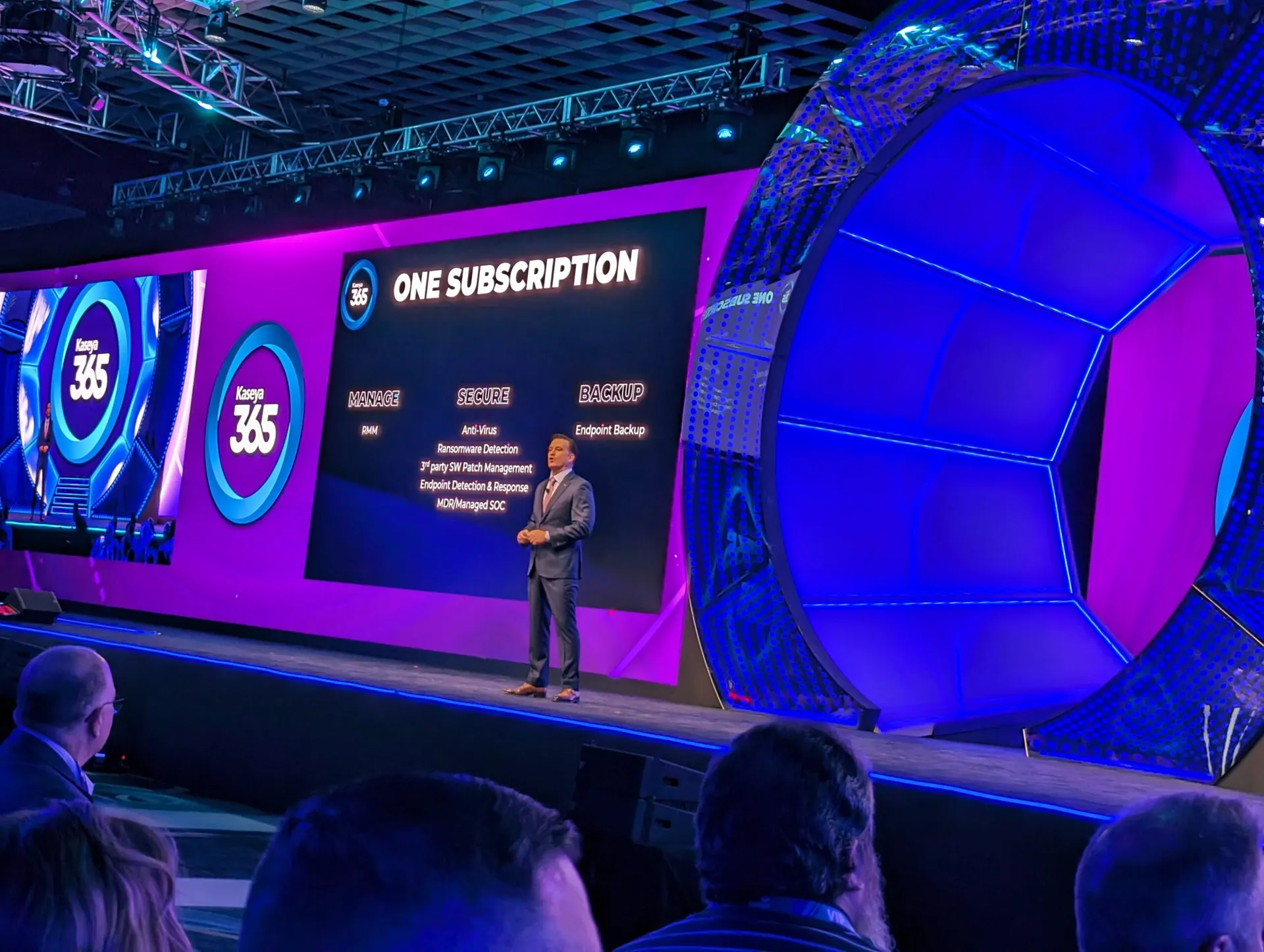- Cybersecurity Firms LogRhythm and Exabeam To Merge
- CEO Fred Voccola Tells the Kaseya 365 Origin Story
- Will Kaseya 365 Trigger an MSP Tool Price War?
- How to Maintain Cybersecurity During M&A
- Wiz Raises $1 Billion to Expand Cloud Security Platform
- MSP Blue Mantis Partners to Offer AI Services to End Customers
- Gradient MSP StackTracker Puts AI Focus on Business Decisions
MSSP Alert is part of the CyberRisk Alliance network of resources for cybersecurity leaders and professionals. Among our brands is our affiliate site, ChannelE2E, which focuses on the managed services market — MSPs — and covers a range of topics of interest to managed service providers.
Those topics include cybersecurity issues, but they also encompass a host of other technology and insights for MSPs. For instance, they include essential MSP tools such as RMM, PSA and endpoint management and emerging technologies, including AI, generative AI and automation. ChannelE2E is also known for its coverage of private equity investments and mergers and acquisitions in the service provider channel.
Because we know our cybersecurity readers at MSSP Alert are interested in additional technologies and issues beyond cybersecurity, we will be bringing some of our top important stories over from ChannelE2E that we think will be informative to MSSP Alert readers. To follow are some of the recent headlines you may have missed from ChannelE2E.
Cybersecurity Firms LogRhythm and Exabeam To Merge
Cybersecurity firms LogRhythm and Exabeam are merging, forging a company that will specialize in AI-driven security ops. Financial terms of the deal were not disclosed.
While details on the structure of the company post-merger have not been provided, the companies said that their customers will benefit from enhanced R&D investments and product innovation. This includes advancements in AI-driven security operations, improved threat detection and response capabilities, and the integration of sophisticated AI and machine learning algorithms to enhance overall cybersecurity defenses.
CEO Fred Voccola Tells the Kaseya 365 Origin Story
Kaseya CEO Fred Voccola rolled out Kaseya 365, a product and service and initiative that he said has been in the works for 10 years, since he first joined the company as CEO. Kaseya 365 made its debut at Kaseya Connect on May 1. Kaseya 365 brings together basic components of the MSP stack into a subscription-based service to manage, secure, backup and automate client environments under a single license at a promotional price of $3.99 per end point per month.
ChannelE2E recently caught up with Voccola to talk about the inspiration for this packaging (spoilers: it’s Microsoft 365), and the 10 years of work that went into making this happen. Voccola describes the Kaseya 365 origin story, and answers key questions (like how will dropping prices so dramatically impact Kaseya’s financials) in his video interview.
Will Kaseya 365 Trigger an MSP Tool Price War?
How are MSPs and industry watchers responding to Kaseya 365 — the bundled package of MSP essentials offered at $3.99 per month per endpoint? There’s no real middle ground. Kaseya partners seem to like it or love it. Other people in the industry think it is disruptive, anti-competitive and speculate that Kaseya has ulterior motives.
ChannelE2E has been on the ground at the Kaseya Connect event this week and we’ve been listening to the chatter. One group of MSPs sitting at a lunch table scrolling through social media criticisms of Kaseya 365 said that those critical MSPs weren’t Kaseya partners and they didn’t understand the nuances and the true benefits.
Another MSP said he’s seriously looking at it and may migrate his RMM off N-able to Kaseya 365. He may actually opt for the “Express” version for $1.75 per endpoint per month that does not include MDR for some of his customers because they already use another MDR and don’t want to switch.
Another MSP said the offer was compelling, but he was hesitating because going all-in with a single vendor also meant you had a single point of failure.
Kaseya partners at the event seemed impressed by and ready to embrace Kaseya 365. They like the Partner-First Pledge. Both announcements got big rounds of applause during CEO Fred Voccola's keynote address.
But many industry watchers voiced their displeasure at Kaseya’s announcement loud and clear. Perhaps the most outspoken on-the-record comment came from Huntress CEO Kyle Hanslovan, who posted his thoughts publicly in a LinkedIn post.
How to Maintain Cybersecurity During Mergers and Acquisitions
As MSP business merger and acquisition activity heats up in 2024, affected companies must ensure that their critical cybersecurity protections are in place and kept up to date. Like any other company, an MSP can get caught up in the complexity of M&A negotiations and inadvertently let their defenses down, leaving them vulnerable to cyberattacks including phishing, DDoS attacks, and more. Guarding against such threats may be even more important when business leaders are busy making M&A deals.
These concerns are particularly relevant today as M&A activity is poised for a rebound in 2024 after a slowdown in 2023, according to research from Morgan Stanley. Morgan Stanley Research expects a 50% rise in M&A volumes compared with 2023 as corporate confidence is increasing and concerns about inflation and global recession continue to fall. Morgan Stanley said it sees six market segments where M&A activity will be on the rise in 2024, including technology, banks, energy, healthcare, hotels and real estate.
Mergers and acquisitions require all organizations to take cautionary steps, but for MSPs they pose even greater risks because their businesses provide trusted services to their customers. MSPs certainly do not want to be vulnerable to cybersecurity attacks that could go on to harm their customers’ businesses as well.
That means that MSPs must be even more vigilant and protective of their cybersecurity processes if they are looking to acquire other MSPs or if they are the target of an M&A by a private equity firm.
Tim Weber, vice president of channel growth at MSSP Cyber74, told ChannelE2E that these are scenarios that MSPs must plan out carefully to protect themselves and their customers.
Wiz Raises $1 Billion to Expand Cloud Security Platform
Cloud security firm Wiz has secured $1 billion in its latest funding round, achieving a $12 billion valuation and bringing the company's total financing to $1.9 billion. The announcement follows the acquisition of cloud detection and response provider Gem Security, as Wiz seeks to expand its cloud-native application protection platform (CNAPP).
This funding round was led by Andreessen Horowitz, Lightspeed Venture Partners, and Thrive Capital, alongside participation from other investors such as Greylock, Wellington Management, and Salesforce Ventures.
Founded in 2020, Wiz reported an annual recurring revenue (ARR) of $350 million in 2023.
The company continues to bolster its leadership team with key hires, including Dali Rajic, formerly COO and president of Zscaler, who joined as chief operating officer and president in early 2024. There have long been rumors that Wiz would become a public company through an eventual IPO, but Rappaport told Reuters that a share offering was not imminent.
Click here for the full story.
MSP Blue Mantis Partners to Offer AI Services
Many MSPs are using AI today because managed services tools vendors have embedded them. These tools incorporate automations and natural language queries that can make MSPs more efficient in ticket operations and other functions.
But what about MSPs offering AI services and AI managed services to their end customers?
Channel market analyst firm Canalys has said that it doesn’t see managed service providers playing any kind of big role in customer AI deployments for at least 18 to 24 months. And yet, some MSPs are really interested in jumping in with both feet now.
One of these is Blue Mantis. The Portsmouth, New Hampshire-based provider of managed services, cybersecurity and cloud solutions is announcing a strategic partnership with AI Technology Partners (AITP) to help senior IT and security executives transform their organizations and enhance productivity through the secure deployment of generative AI tools, including Copilot for Microsoft 365. AITP is a consulting firm that helps organizations implement AI.
This Blue Mantis/AITP partnership combines Blue Mantis’ services expertise with AITP’s consulting, data, analytics and AI capabilities.
As the managed services and managed security markets heat up, a faster way to market is through partnerships. This one is a perfect example of how an MSP can bring AI managed services to market today instead of waiting 18 to 24 months. Just as MSPs partner with MSSPs or vendors to offer advanced cybersecurity solutions, such as MDR and EDR, MSPs can also partner with consulting firms that are experts in AI to offer those services to end customers.
Blue Mantis and AITP have developed a joint go-to-market strategy and service offering for mid-market enterprise clients called Managed AI Copilot Solutions, Powered by Microsoft. The goal is to deploy, integrate and optimize Copilot at scale for Blue Mantis’ end customers.
Gradient MSP StackTracker Puts AI Focus on Business Decisions
Most companies that serve MSPs today are embedding generative AI and automations into their platforms to make operational technology better for MSPs — to improve workflows, speed up service desk ticket closures and generally make operations more efficient.
But AI has the potential to do much more than that for MSPs. What if you could point AI at all the data collected by your many tools and platforms and then ask AI for recommendations about how to improve your business operations, too? For instance, how many of your customers are using all the technologies in your stack? Can you generate a list of customers not using a particular service and target those customers for the upsell? Which of your vendors have proven the most profitable for your business? What is the most profitable vendor to consolidate your clients onto for, say, BDR?
Those are the kinds of questions that Gradient MSP is seeking to answer for MSPs with StackTracker, a SaaS product designed to redefine the way MSPs track their business and make strategic, data-driven decisions. StackTracker provides insights into product category coverage, vendor spend, resale revenue and profitability on both product and client levels.
“It’s not looking at some representation of what MSPs think they’re supposed to be billing or what they are set up to bill. We are able to capture and understand what their cost is for those solutions,” said Colin Knox, founder and CEO. “Now we can quantify what the value in profit is to MSPs to consolidate to one vendor in a category. They know what their volume is, they know what their margin is, they know who their best margin provider is.”
The software is designed to help MSPs make better business decisions and determine how they will sell into customers.




